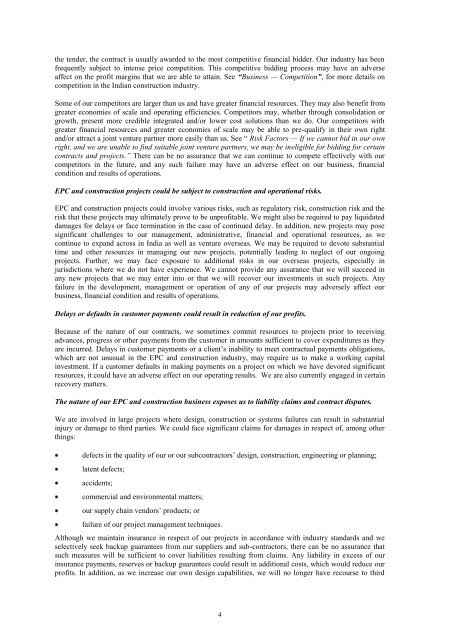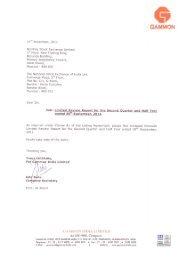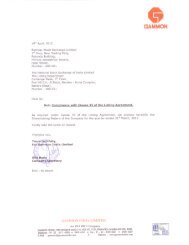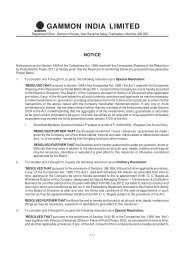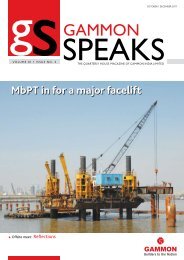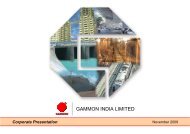GAMMON INDIA LIMITED
GAMMON INDIA LIMITED
GAMMON INDIA LIMITED
You also want an ePaper? Increase the reach of your titles
YUMPU automatically turns print PDFs into web optimized ePapers that Google loves.
the tender, the contract is usually awarded to the most competitive financial bidder. Our industry has been<br />
frequently subject to intense price competition. This competitive bidding process may have an adverse<br />
affect on the profit margins that we are able to attain. See “Business — Competition”, for more details on<br />
competition in the Indian construction industry.<br />
Some of our competitors are larger than us and have greater financial resources. They may also benefit from<br />
greater economies of scale and operating efficiencies. Competitors may, whether through consolidation or<br />
growth, present more credible integrated and/or lower cost solutions than we do. Our competitors with<br />
greater financial resources and greater economies of scale may be able to pre-qualify in their own right<br />
and/or attract a joint venture partner more easily than us. See ― Risk Factors — If we cannot bid in our own<br />
right, and we are unable to find suitable joint venture partners, we may be ineligible for bidding for certain<br />
contracts and projects.‖ There can be no assurance that we can continue to compete effectively with our<br />
competitors in the future, and any such failure may have an adverse effect on our business, financial<br />
condition and results of operations.<br />
EPC and construction projects could be subject to construction and operational risks.<br />
EPC and construction projects could involve various risks, such as regulatory risk, construction risk and the<br />
risk that these projects may ultimately prove to be unprofitable. We might also be required to pay liquidated<br />
damages for delays or face termination in the case of continued delay. In addition, new projects may pose<br />
significant challenges to our management, administrative, financial and operational resources, as we<br />
continue to expand across in India as well as venture overseas. We may be required to devote substantial<br />
time and other resources in managing our new projects, potentially leading to neglect of our ongoing<br />
projects. Further, we may face exposure to additional risks in our overseas projects, especially in<br />
jurisdictions where we do not have experience. We cannot provide any assurance that we will succeed in<br />
any new projects that we may enter into or that we will recover our investments in such projects. Any<br />
failure in the development, management or operation of any of our projects may adversely affect our<br />
business, financial condition and results of operations.<br />
Delays or defaults in customer payments could result in reduction of our profits.<br />
Because of the nature of our contracts, we sometimes commit resources to projects prior to receiving<br />
advances, progress or other payments from the customer in amounts sufficient to cover expenditures as they<br />
are incurred. Delays in customer payments or a client‘s inability to meet contractual payments obligations,<br />
which are not unusual in the EPC and construction industry, may require us to make a working capital<br />
investment. If a customer defaults in making payments on a project on which we have devoted significant<br />
resources, it could have an adverse effect on our operating results. We are also currently engaged in certain<br />
recovery matters.<br />
The nature of our EPC and construction business exposes us to liability claims and contract disputes.<br />
We are involved in large projects where design, construction or systems failures can result in substantial<br />
injury or damage to third parties. We could face significant claims for damages in respect of, among other<br />
things:<br />
defects in the quality of our or our subcontractors‘ design, construction, engineering or planning;<br />
latent defects;<br />
accidents;<br />
commercial and environmental matters;<br />
our supply chain vendors‘ products; or<br />
failure of our project management techniques.<br />
Although we maintain insurance in respect of our projects in accordance with industry standards and we<br />
selectively seek backup guarantees from our suppliers and sub-contractors, there can be no assurance that<br />
such measures will be sufficient to cover liabilities resulting from claims. Any liability in excess of our<br />
insurance payments, reserves or backup guarantees could result in additional costs, which would reduce our<br />
profits. In addition, as we increase our own design capabilities, we will no longer have recourse to third<br />
4


